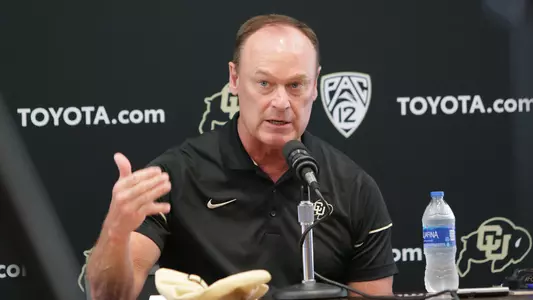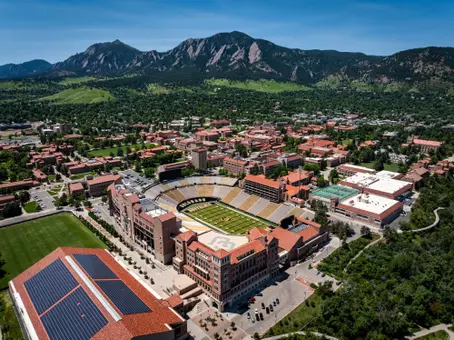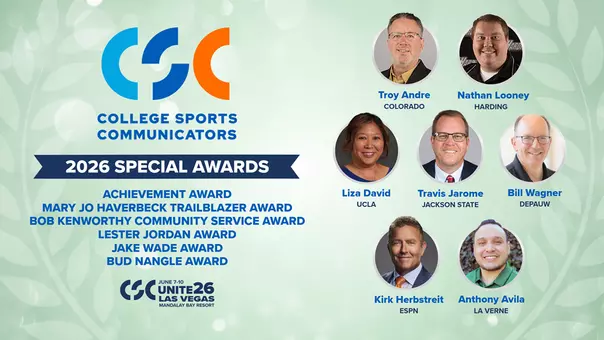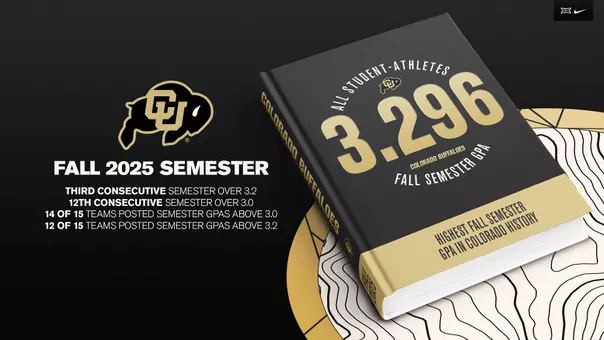Colorado University Athletics

Woelk: After Navigating Unprecedented Year, CU's George Looks To Opportunities Ahead
July 08, 2021 | General, Neill Woelk
BOULDER — Colorado Athletic Director Rick George took a quick look back Thursday morning at 2020-21, a year that proved to be like no other in college athletics history and one that still saw the Buffs produce success despite the obstacles.
But it is clear that George is more than happy to look ahead toward a college sports landscape ready to return to "normal" while also welcoming some generational changes — beginning with the institution of name, image and likeness legislation that will no doubt have a significant impact on colleges across the nation.
"We have to think big if we're going to do big things and we're going to think big," George said. "There's a lot ahead of us … I know this has been an incredibly challenging 18 months, and I'm proud of what our student-athletes achieved. But what I'm really looking forward to is what's ahead and what we can accomplish here."
George — and every CU fan, for that matter — has good reason to be proud of what the Buffs accomplished during a pandemic that produced unprecedented obstacles. Colorado student-athletes were successful in the classroom and on the playing surface, producing outstanding results in both:
— "We had our best academic success that we've had in our history," George noted of a year that saw CU student-athletes achieve an overall 3.139 GPA in the spring semester and a cumulative 3.158 GPA. "We all know how difficult it was on our student athletes. I'm really proud of their efforts. It was a challenging year but I still believed we achieved a lot."
The spring marked the 14th straight semester CU student-athletes produced at least a 2.9 GPA as a group. CU has hit that mark for a semester only 15 times since 1994.
— On the field, the Buffs produced postseason appearances in football, men's and women's basketball and soccer; as well as a Pac-12 tourney championship game appearance in lacrosse. CU's ski team finished second in the NCAAs, and a number of Buffs also earned national honors in track and field.
— The Buffs will also have their share of the spotlight at the Summer Olympics in Tokyo, with four former CU standouts earning Olympic berths — Emma Coburn and Val Constien in the steeplechase; Joe Klecker in the 10,000, and Morgan Pearson in the triathlon.
But there is no doubt that George and every other CU staffer and student-athlete are looking forward to 2021-22, when Colorado will welcome back fans at 100 percent capacity at all venues after a year of playing in front of virtually empty stadiums and arenas.
The biggest change in college athletics, however, won't be in the competitive arena or the classroom. Rather, the implementation of NIL legislation — which will allow athletes to earn money from their name, image and likeness — will no doubt bring about significant change.
"I'm excited for our student-athletes to be able to monetize their name, image and likeness," George said. "I think it's a natural progression. We've done a lot for our student athletes over the last 5 to 10 years. Name image and likeness is a natural step in that progress."
George did emphasize that he believes the process needs to be uniform across the nation.
As it stands now, 19 states, including Colorado, have separate NIL legislation. Meanwhile, instead of instituting any nationwide guidelines, the NCAA chose to leave NIL guidance up to individual states — and those without any legislation in place can simply establish their own rules.
"I think it's important that we have one set of rules," he said. "I think having 19 states that have different laws that people are going to follow and 31 states where they can make up their own doesn't work. It causes confusion, particularly for a high school student-athlete who says 'I can do this at Institution X but I can't do it at Y.' It's important that we have one set of guidelines that everybody can look at and say we're all playing by the same rules. We don't have that now."
But George also countered suggestions that monitoring NIL activity will be a "nightmare," and he pushed back on the theory that NIL will provide an unfair advantage for some schools and leave others at a disadvantage.
"It's a great time for college athletics," George said. "Some people look at it as if there's all these challenges. I view them as opportunities. We're going to look at it as opportunity and how we can make our department and our student-athletes better moving forward. We'll be creative and we'll do the things we need to do to continue to make Colorado Athletics an elite department."
As for being an advantage — or disadvantage — George stressed that while new and important, NIL benefits will still be just one piece of the overall recruiting puzzle. Schools have long been operating from different platforms, with each having varying strengths and weaknesses.
NIL is just another element.
"We provide incredible programs for our student-athletes and will continue to do that," George said. "We have a lot to sell. Recruiting has always been imbalanced in some way because people do it a little differently at every place. We just have to know what we do really well and sell that. There's a big focus on NIL but there are so many other factors that are important to student-athletes."
Among those factors, George noted, are CU's WHOLE Student-Athlete program, a unique program that emphasizes wellness, health and optimal life experience. Others include the quality of the Boulder community, educational opportunities and leadership/career development programs.
"I feel really good about what we have in our briefcase that we can sell," George said. "I'd put that up against anybody. Name, image and likeness is only going to enhance our opportunities to become a better program."
Other topics George covered included:
— New Pac-12 commissioner George Kliavkoff, who officially took the reins July 1.
"I've had an opportunity to speak with 'Commissioner K' a couple times," he said. "We've met with him in person and I'm really excited about him starting. His knowledge of the issues in college athletics was good to hear. He's really knowledgeable in all those areas. He's got the right enthusiasm and excitement for his role and what it means. Having digital media in his background when he was with Major League Baseball is going to bode well as we talk about our TV partnerships and our TV process moving forward. I'm excited that he's here."
— Budgetary concerns. Despite having zero ticket revenue last year (CU reaped $23 million the prior year from tickets) and receiving only about 60 percent of the normal conference payout, the Athletic Department finished fiscal year 2021 with about an $18 million deficit. That is far less than many other departments around the nation.
"I feel really good about how we finished fiscally. We had to do some difficult things (such as furloughs and layoffs)," George said. "But to be able to operate the way we did, I feel really good about it."
George said CU will correct the deficit via a Pac-12 loan program, which will deduct loan payments from annual conference payouts over the next seven to eight years.
— Football season ticket renewals are at about 77 percent. IN 2019, the number was close to 86 percent in a season that featured Nebraska on the home schedule. George also noted that CU had one of its best days of public sales in his tenure earlier this week, and he expects the interest to increase as the season gets closer.
CU's home schedule is an attractive one, featuring a game in Denver vs. Texas A&M, along with contests at Folsom against Northern Colorado, Minnesota, USC, Washington, Arizona and Oregon State. One national publication earlier this week ranked CU's non-conference schedule one of the10 toughest in the nation.
— Fan experience. With CU now allowed to welcome 100 percent capacity back to its facilities, George said some changes will be instituted that should help the overall fan experience. CU is currently developing an app that will provide traffic updates and could include options for ordering food at the stadium, and tailgating will return in full force.
George said he hopes to have specifics for fans by early to mid-August.
— Capital improvements. George said he is hoping to be able to host concerts on campus in May and June of next year, events that will help generate substantial revenue.
And, he said the department is still hoping to begin planning for some major facility improvements and additions. Those would include a renovation of the west side of Folsom Field, some floor repairs in the stands, and a sound system renovation. Other possible projects include an indoor tennis facility and a dedicated soccer-lacrosse stadium. "I think all of those things are on the horizon, but not something we're ready to tackle today," George said. "We'll come up with a plan in the next six to nine months."
Contact: Neill.Woelk@Colorado.edu





